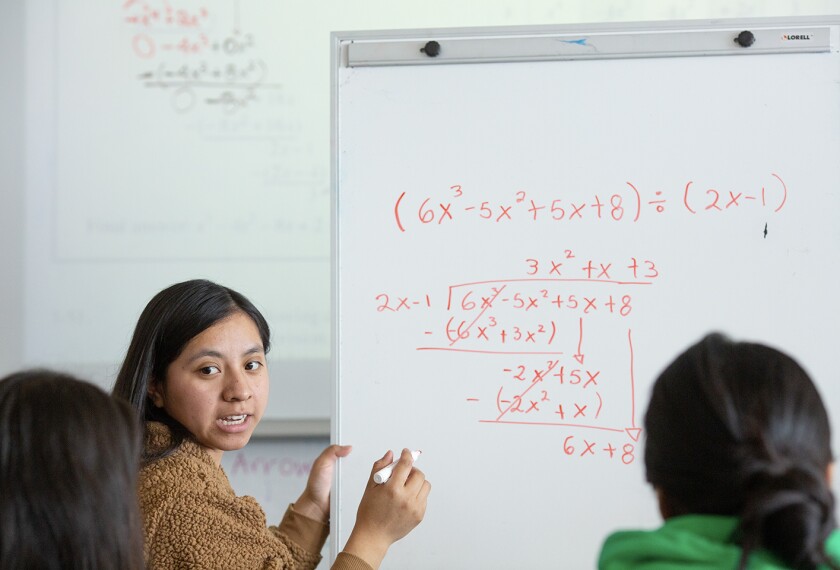Tutoring has become a popular intervention for schools grappling with stagnant academic achievement.
A large body of evidence demonstrates that high-impact, high-dosage tutoring can effectively move the needle on student academic outcomes.
Now, a new study from Stanford University is adding to that body of research, finding that pairing girls with female math tutors increases the students’ STEM interest and improves their academic performance in math.
Carly Robinson, the director of research for the SCALE Initiative at the Stanford Accelerator for Learning, spoke with Education Week about the implications of the study.
This conversation has been edited for length and clarity.
Why study the impact of a tutor’s gender on girls’ academic achievement?

There’s a lot of literature out there on demographic matching between students and teachers and how students who share demographic similarities with their teachers may experience some better academic or social outcomes. That hasn’t really been explored in the tutoring space.
This study [conducted in the 2021-22 school year], in particular, focuses on 9th grade students taking algebra—a gateway course to their future experiences in math and other STEM subjects. What could the impact of a math tutor in 9th grade be on their educational experiences?
One of the things that also is evident in the literature is that despite performing equally well in STEM subjects and in math, girls are underrepresented in upper-level STEM courses, in pursuing STEM majors, and in pursuing careers in STEM.
All of these things together really motivated our interest in studying what the impact of exposing high school girl students to female tutors and how that would impact both their motivation and interest in STEM as well as their performance.
What were the study’s findings?
We were really looking at the end-of-the-year perceptions and performance over the course of the year.
We found, among students who took the final survey about their tutoring experiences, [that] girl students who were paired with female tutors had reported greater interest in STEM compared with girls who were paired with male math tutors. We measured their interest in STEM by asking students how interested they were in pursuing STEM as a major in college, how interested they were in a STEM career, and how useful they thought math would be to them in the future.
We were also able to look at their course grades over the course of the year and we saw that when girl students had a female tutor, as opposed to a male tutor, they were about 4 percentage points more likely to earn a C-minus or better in Algebra 1. There was no standardized assessment to look at, so view this as suggestive evidence that their performance and, subsequently, their course grade improved as a result of that exposure to the female math tutor.
What do you think educators should take away from this?
I actually don’t think the right practical or policy solution is to match the tutors based on their demographics, whether it be gender or race or another feature. I think that could have a potential negative impact on other things. But I do think that it highlights that maybe girls don’t often see themselves in STEM and that being exposed to a female tutor who represents the pathway that they could take is impactful. This idea of ensuring that your tutor base or educator base is more diverse and represents the students who they’re working with, which would allow for that sort of exposure and role modeling, might be a way to positively impact the educational experience for students.
Why might it be a challenge for schools to have an educator or tutor base that’s more representative of the student population?
What’s proved to be very hard is to change the demographics of the educator workforce in a short period of time, particularly for teachers. However, tutoring is an interesting example of how you might be able to build a more diverse supply of these educators in a shorter time, because the barriers to serving as a tutor are lower. This is a hypothesis that we’re trying to test in some of our other studies, but [tutoring] could be a pathway toward diversifying the teacher pipeline down the road, too.
Are there other findings from the study that you want to highlight?
We saw that the increase in STEM interest and course grades among girls were being driven by tutoring that was taking place in person as opposed to virtual formats. We didn’t randomly assign whether students were receiving tutoring virtually or in person, so we can’t make the causal claim that in-person tutoring matters more for the female student-tutor gender match, but we see the results were largely driven by those students and tutors who are working together in person. In both cases, whether it was in-person or virtual tutoring, the tutoring was part of the school day. There’s more to learn about how these different types of learning formats can affect the relationship between educators and students.







